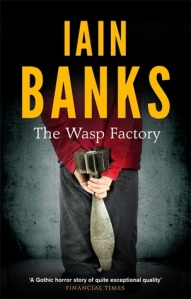I first read The Wasp Factory back in 1984/5, not long after it was released. I was 15 at the time and this wasn’t my usual reading fare so I’m not sure what made me choose it but choose it I did, starting a life long liking of Iain Banks as an author. Over the years, I have read most of his books but never re-read any, including The Wasp Factory. This, despite the fact that some parts of the book (I now know for certain) have stayed with me a long time.
“Two years after I killed Blyth I murdered my young brother Paul, for quite different reasons than I’d disposed of Blyth, and then a year after that I did for my young cousin Esmerelda, more or less on a whim. That’s my score to date. I haven’t killed anybody for years, and don’t intend to ever again. It was just a stage I was going through.”
It is possibly because I have such clear memories of it that I have never revisited it. Picking it up at the library recently, I did wonder if it was a good idea. What if I didn’t like it? What if it was horribly dated? What if it was mediocre at best? As it was, none of these were the case and I was able to breathe a sigh of relief at the end. An end which, no matter how hard I tried I could not bring to mind. I was glad I couldn’t because it is a great twist at the end of a rather dark story and means there is a little, just a little, potential light at the end of the tunnel for the main character Frank.
Frank is the narrator of The Wasp Factory, which is told in the first person. He lives on a semi-island somewhere off the Scottish coast near Inverness. His life is anything but ordinary. His dad decided not to register him when he was born (he was, Frank tells us, a hippy) and so he has never been to school, has no real friends. and spends his days patrolling his island, building and blowing up dams and killing animals for what are best described as totems. The rituals by which he lives his life really drew me in.
“All our lives are symbols. Everything we do is part of a pattern we have at least some say in. The strong make their own patterns and influence other people’s, the weak have their courses mapped out for them. The weak and the unlucky, and the stupid.”
He seems to have no understanding of people or the real world and no empathy for anyone other than his brother, Eric. Eric’s escape from a mental hospital opens The Wasp Factory and is the catalyst for Frank and his father’s lives unravelling as he slowly makes his way across Scotland to the island. To me, though, this was secondary to what was going on inside Frank’s mind, all of which I was privy to. And what was going on wasn’t pretty. Or normal. This really is the mind of what I guess could be described as a potential psychopath, a serial killer in the making (he’s already killed three children if he’s to be believed).
“I killed little Esmerelda because I felt I owed it to myself and to the world in general. I had, after all, accounted for two male children and thus done womankind something of a statistical favour. If I really had the courage of my convictions, I reasoned, I ought to redress the balance at least slightly. My cousin was simply the easiest and most obvious target.”
I remember how violent this book had seemed when I first read it but, a sign of the times maybe, it now seems quite tame on the murder front. Though, if anything the deaths are cleverer than a lot I now find in crime books. Frank may be a killer, but he’s smart. He’s also dark and unsettling, as is the book. There is a calmness and clarity to the way Frank describes his actions that make this story feel real.
This wasn’t a comfortable read then and it isn’t now. The fact that it still had the power to make me feel uncomfortable is a testament I think to the way Iain Banks writes and just how good the book is. So glad I revisited it. Well worth picking up if you haven’t already.
Emma

Somehow I’ve never read any Iain Banks but I have no idea why. That excerpt you posted is just eerie. Adding this to my TBR!
LikeLike
I think he is maybe one of those slightly forgotten authors? Hope you enjoy when you do read. Erie is good description. Emma
LikeLike
I read this book last year – my first Iain Banks. Saw it recommended on another blog and being a new to me author I took the plunge and ordered at the library. It was what I call a ‘moorish’ read, needed lots of concentration but hard tp put down. Not quite ‘wtf’ more like ‘what on earth is he on about’. Great ‘different’ read, in the end I gave it 4 stars. Must look for more of his books.
Cathy
LikeLike
I just found I couldn’t put it down either time. For some reason The Bridge is the other than I’ve never really shaken. Might be your next read for him?
LikeLike
[…] book that has stood the test of time for me was The Wasp Factory by Iain Banks, which I first read almost 30 years ago (showing my age!). I remember it as a […]
LikeLike
[…] The Wasp Factory by Iain Banks. A book I first read 25 years ago and was happy to see has stood the test of time and memories. A […]
LikeLike
[…] The Wasp Factory by Iain Banks […]
LikeLike